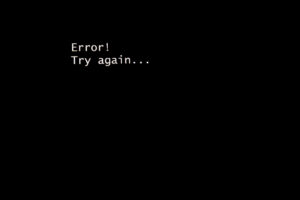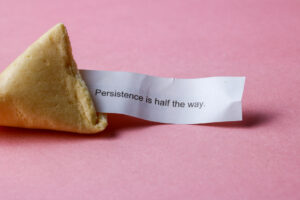
After more than four years of intensive blogging, I have decided that a new phase in my business life is about to begin. I am currently developing a new offer for top executives – more online soon…
Thank you for being such loyal readers and for always giving me positive feedback. I am aware that some will miss my blog (I take that as a compliment). But we’ll stay in touch otherwise. And if you want to read more from me, you are welcome to pre-order my book “Nachhaltig leistungsfähig bleiben – Praxis-Tipps für den Business-Marathon” (only available in German) here: www.stressandbalance.ch.

Making a mistake – no one likes to do that. Because no one wants to fail. Shame and maybe even a strong negative reaction from the boss are the consequences. But successful companies recognise an opportunity in mistakes – because they offer the chance to learn. And if you don’t dare to do anything (and thus also fail sometimes), you don’t win anything. Companies with a constructive error culture are more innovative, more agile and therefore more successful in the market. > More

An acute crisis presents us with great challenges. We feel helpless and see no way out. Our mental and sometimes physical balance is lost. Good to know: most crises have an almost identical sequence: shock, reaction, processing and reorientation. So it takes the valley of tears before things start to look up again. We can often influence the speed of this process ourselves. > More

Good habits should be nurtured. To mark the start of the New Year, I am therefore once again publishing a selection of wise quotes from fascinating people whom we can learn from – rather than one of my regular blog texts. I hope you enjoy reading them and gain some new insights. Above all, I wish you the best of health in 2021! > More

Like I do every year before Christmas, I am republishing the article from my blog that attracted the highest readership in 2020. This year – not surprisingly and by a large margin – one of my corona texts (date: March 31): Many of you are probably in the exact same position as me: You are stuck at home 24/7. Cooped up – in many cases with children who are supposed to be doing home schooling but need help even though their parents need to work. Add to that the uncertainty about the impacts that the coronavirus could have on our health, our financial situation, and the economy and society as a whole. Is there something that can help us to get through these challenging times?
> More

In my last blog post (link), I wrote about how fear can be a valuable part of life that warns us of dangers. However, many people find that fear dominates and controls their lives and has a debilitating effect on them. There is one form of anxiety that is particularly acute and strong at present – the fear of the corona virus. I will explain to you today which steps you can take if you are worried about corona and are generally experiencing a high level of anxiety. I will also pinpoint those strategies that are not effective.
> More

Being afraid is viewed as something negative by many people – they regard it as a sign of weakness. However, that is only the case if fear takes over and starts to dominate our lives. Fear can also protect us from danger and thus save lives – as we have seen during the current corona pandemic, for example. In today’s blog post, I explain the two sides of fear and I also look at anxiety related specifically to corona. In my next post, I will provide some concrete tips on how to overcome your fears. > More

Perhaps you know the saying: ‘You never get a second chance to make a first impression’? Our brain automatically determines in a fraction of a second whether or not we like another person. And in most cases, that first impression lasts for a long time. Today, I will explain to you how you can create a good first impression and how it is possible to correct the way you are perceived if the first impression you make is not positive. > More

Developing your leadership skills is at least as important as growing your specialist knowledge, says Stefanie Weber, Head of Group Human Resources at Swiss Life, in an interview. However, line managers frequently fail to devote sufficient time to this topic. Weber believes that managers today perform a variety of roles – including serving as a coach and mentor. She says that managers who judge their employees’ performance based on the amount of time they spend at work – and not the value the create – are following out-of-date practices. > More

We reach decisions all the time – experts estimate that we make between 20,000 and 100,000 each day. Most of them are instantaneous: Should I put on blue or black trousers? Are we going to an Italian or Chinese restaurant this evening? However, we find it difficult when we have to reach decisions that could have a major and lasting impact on our future lives. One thing is certain: Not deciding is the worst decision we can make. > More

The Dalai Lama once said: “When you talk, you are only repeating what you know; but when you listen, you learn something new.” If you are always airing your views – which is the case with many people – you don’t even grasp the essence of what is being discussed. If you listen carefully, the other person has the feeling of being heard and is therefore more willing to listen to your viewpoint. Active listening is key – meaning that you focus your full attention on the other person.
> More

I asked all my coaching clients about their experience of the corona crisis in terms of negative and positive impacts and what they now do differently to before. They indicated that the most negative aspects for them were the restrictions on their freedom of movement, combined with a loss of control and the fact that they could only maintain relationships remotely. On a positive note, they had more time for their family, were less busy and led healthier lives. They want to retain many of these positive aspects going forward.
> More

In my last blog post, I talked about the different success factors that ensure a team works well (link). As announced, I am today focusing on another very important aspect of this topic: The role of managers. What can they do to help foster good collaboration between team members? And what are the potential stumbling blocks that they need to watch out for? > More

Working in a great team is not only fun but also a source of success. After all, a team that works together effectively can achieve far more than its members could ever accomplish individually. But what are the prerequisites for a team to function well and deliver a top performance? A common goal and clear rules are a must for optimal cooperation. In addition, a culture of innovation and collaboration must be established. > More

Stress is not only tragic for the individuals concerned, since it harms their health and wellbeing (see my last blog post). It also has a high cost for companies because it undermines the quality of work and lowers the productivity of affected employees, as well as impacting on other team members. The consequences are grave: According to the 2018 Job Stress Index published by Gesundheitsförderung Schweiz[1], stress cost businesses in Switzerland an estimated CHF 6.5 billion – the highest figure since the organization began measuring the financial fallout of stress in 2014. > More

“I am stressed” – we often hear people say this nowadays. However, stress is not an issue to be taken lightly, since excessive or prolonged pressure may not only have an impact on our psyche but can also lead to serious or even life-threatening conditions. Chronic stress can, for example, lead to a heart attack, diabetes, seriously weaken your immune system or result in severe digestive disorders. > More

Many of you are probably in the exact same position as me: You are stuck at home 24/7. Cooped up – in many cases with children who are supposed to be doing home schooling but need help even though their parents need to work. Add to that the uncertainty about the impacts that the coronavirus could have on our health, our financial situation, and the economy and society as a whole. Is there something that can help us to get through these challenging times? > More

Anna Jelen is an expert on time and a refreshing lateral thinker (see image…). I got to know Anna at a joint workshop a few years ago and I really value her as a person. In the following interview, she explains the different factors that adversely affect our lives nowadays: Anna believes we are too focused on the future and worry too much. Her advice is that we should live more for the present and make a conscious effort to create individual moments that we can enjoy. This helps us to tame our wandering spirit and to make the most of each day. > More

When was the last time you really roared with laughter? I hope it wasn’t so long ago that you don’t even remember it. I say that because laughter is good for us, both mentally and physically. Laughter activates the cardiovascular system, pumps more air into the lungs and brain, and reduces the sensation of pain. It also makes us feel less stressed – and when we laugh together, this has a positive impact on relationships. Read on to find out some fascinating and funny facts about laughter! > More

“Is it really possible to manage my boss?” You may now be asking yourself this question. The answer is: Yes! I know from experience that the most important thing is to gain the complete trust of your superior by showing him* that he has your full backing. The second step is to find out what is important to your manager and what makes him tick. You can then start to exert a positive influence over him. Managing from the bottom up requires patience, intuition, good observation skills and a tactical approach. > More

For the second time, I am starting the year by sharing a collection of quotations that appeal to me or that I find moving or thought-provoking. There are so many people who have said so many wise things. See if they inspire you! > More

Like I do every year before Christmas, I am republishing the article from my blog that attracted the highest readership in 2019: Nowadays, our lives are marked by constant interruptions – e-mails, messages, calls, being disturbed by colleagues, etc. This is not without consequences: According to a Microsoft study, our attention span is now only nine seconds, one second less than that of goldfish! This in turn leads to more errors, lower productivity and poorer memory. This has prompted Cal Newport, a US professor of computer science, to declare: “Focus is the new intelligence quotient.” > More

Do you remember exactly how your coffee tasted this morning or what the water felt like when you showered? In our hectic everyday lives, we sometimes forget that it is really important to live in the moment now and again. We are usually one step ahead of life: When drinking our coffee, we are already thinking about our first meeting, or during lunch, we remember that we still have to arrange some repairs at home, etc. It is unfortunate because focusing on the here and now has many advantages. That includes making us more efficient and content. > More

‘Our employees are the key to our success’ and ‘Employees are our greatest asset’ – slogans such as these are often seen on company websites or in mission statements. Unfortunately, the reality is quite different: Employees feel they are treated much worse than their superiors imagine – resulting in frustration, demotivation or mental resignation. One factor can make all the difference: Showing your employees appreciation and recognition. > More

We live in a performance-driven society where people think it is bad to take a break. But they are wrong: Breaks are a sensible investment in your health and your ability to function efficiently. We need evenings, weekends and vacations to recuperate so that we can be productive again afterwards. We also need to take a number of micro breaks during the day, since our body and brain are not designed to work 8 to 10 hours at a time. > More

In the first two parts of my trilogy about change, I explained the impact it has on people and how you, as a manager, can successfully master transformation periods. Today, the German change management expert Winfried Berner – who is renowned for his to-the-point advice – offers valuable tips based on his many years of experience in this field. > More

In my last blog (Link), I explained how people are affected by change. Today, I would like to tell you how you, as a manager, can successfully deal with transformation phases – including aspects that you must pay attention to and what you should avoid doing. The top tips are: Give employees time to process what it happening, listen to them, share as much information with them as possible, and make sure that what you say is clear and binding. You can never communicate enough during periods of change. > More

That is an easy question to answer: For the majority of people, change is first and foremost a source of stress. However, change is a constant feature of our lives today. We must therefore learn to deal with it. For this reason, I am dedicating a trilogy of blogs to this topic – the first of which focuses on the psychology of change. My next blog will look at the contribution that managers make in change management processes. I will then publish an interview with a change specialist at the start of October. > More

“You cannot not communicate” – you’ll no doubt have heard this statement by Paul Watzlawick. We still communicate even when we don’t say anything. That is because language accounts for only a small part of our effect on others. It is first and foremost our body language and secondly our voice that conveys a message. And conversely: A change in our body language can influence our thoughts and feelings. > More

There is no objective answer to this question. Your response doesn’t actually say anything about the glass itself but it reveals a lot about your attitude. Since the Stone Age, man has essentially had a deficit-oriented perspective since this was vital in order to survive. Today, this is more harmful than beneficial – but fortunately, it is possible to change that mindset. After all, the question of whether we are optimistic or pessimistic has a major influence on our life. > More

Prince Charles has been waiting for more than six decades to ascend to the British throne. In contrast, we grow restless after just five minutes of waiting for the bus. We are so strongly programmed to always be active that we don’t know how to deal with episodes of boredom. However, our brains need periods of doing nothing in order to be creative and productive in the long term. > More

We all perform a lot of different roles in our lives – depending on our age, profession, rank, social aspects, etc. Some are roles we have chosen ourselves, others have been ‘assigned’ to us. Which roles are most important to you and how do you perform them? Which roles do you want to reduce and which do you want to expand? This is a fascinating discussion you can hold with yourself. > More

Nicolas Durville is CEO Switzerland of Zühlke, a rapidly expanding innovation service provider that operates internationally. In the following interview, he describes the skills that employees must bring to the table in order to succeed: An inquisitive nature, courage, willingness to take risks, leadership qualities and team spirit. Durville emphasizes that in an organization driven by innovation, it is vital to promote an error management culture and to encourage continuous training and development. > More

You have prepared well and are ready for your exam. However, a few days beforehand, you start getting stressed about it: You don’t sleep well, feel sick and break out in a sweat. And during the exam itself, your mind goes completely blank. All that effort is wasted! But it doesn’t need to be that way. We can learn mental strength and develop tips and tricks to ensure we can sit an exam with confidence. > More

For many people, acceptance is a sign of weakness or defeat; they see it as giving up or being beaten by someone – or they even view it as resignation. The question is: Do we actually gain anything from battling with situations that are simply the way they are? I believe the answer is no. If we show resistance in the face of things we cannot change, this harms our bodies and minds. > More

I love sayings and quotes because these words of wisdom really get to the heart of the matter – and we can learn a lot from them. That said, I don’t see any wisdom in this quote from the filmmaker Rainer Werner Fassbinder that you are bound to have heard before. On the contrary: It is simply wrong! Getting enough sleep and the right quality of sleep is essential for our health – and it allows us to function properly. Chronic sleep deprivation is detrimental to our health and costs the economy billions. > More

Nowadays, our lives are marked by constant interruptions – e-mails, messages, calls, being disturbed by colleagues, etc. This is not without consequences: According to a Microsoft study, our attention span is now only eight seconds, one second less than that of goldfish! This in turn leads to more errors, lower productivity and poorer memory. This has prompted Cal Newport, a US professor of computer science, to declare: “Focus is the new intelligence quotient.” > More

Here is a completely new style of blog to start the New Year. It quotes this very apt remark by Aristotle as well as numerous other wise sayings that question the status quo or reveal new points of view and may capture your attention or even bring a smile to your face – these are my personal favorites. I hope they will inspire you and give you food for thought. > More

Like I do every year before Christmas, I am republishing the article from my blog that attracted the highest readership in 2018. Incidentally, it is the very same article that I published at the beginning of December – either by coincidence or because of the fascinating topic it covers: A burnout not only has dramatic consequences for the individual concerned but also for the company. The question that arises in this context is whether the firm is (partly) responsible for the breakdown suffered by the employee and whether he or she could sue the employer. I therefore asked the lawyer and Managing Director of SIZ Care AG about the legal aspects of stress and burnout. > More

A burnout not only has dramatic consequences for the individual concerned but also for the company. The question that arises in this context is whether the firm is (partly) responsible for the breakdown suffered by the employee and whether he or she could sue the employer. I therefore asked the lawyer and Managing Director of SIZ Care AG about the legal aspects of stress and burnout. > More

My coaching experience has taught me that perfectionism is one of the main reasons why people get stressed. We want to do everything 1000% correct – but what good does it do us? Not much. It can even be harmful to us: We take far too much time to complete one thing and have insufficient time for other tasks. Perfectionists also have trouble actually getting started with work and reaching decisions. After all, there is a risk that it may not be perfect… > More

In my last blog [Link], I explained what self-confidence is all about and what leads to low self-esteem. It’s now time to look at the specifics: Today, I am going to give you some tips on how to build up or regain your self-confidence. Let’s begin with the most important points: Stop comparing yourself with others, become aware of your strengths and accept your weaknesses. But also pay attention to the words you use and to your body language. > More

What an arrogant statement, you may be thinking – but on the contrary: It is good for you to know what you are good at and to be proud of it! Clearly, no one is perfect. However, a lot of people put themselves down and make out that they are worse than they really are. In today’s blog, I will explain to you what it means to have good self-esteem and what influences it. And in three weeks’ time, I’ll give you some concrete tips on how to strengthen my self-esteem. > More

In my last blog (link) I wrote that we humans are creatures of habit and I explained why this makes it difficult for us to break the habit loop. A lot of effort and determination are needed to avoid certain patterns of behavior and – most importantly – to replace them with new habits. Today, I will tell you how this works and I will give you some practical tips. > More

This Ovid quote says it all: How often have we all tried to break a bad habit – without succeeding? Habits are a form of automatic behavior and are therefore very difficult to change. The fact that man is a ‘creature of habit’ also has a positive side, since life would be much more strenuous without these recurring actions. Unfortunately, however, our brains cannot distinguish between good and bad habits. > More

You are no doubt familiar with the saying ‘making a mountain out of a molehill’. Just think how quickly we get worked up about small issues so that they soon seem like HUGE problems. However, it doesn’t have to be that way. In other words: Mountains can become molehills again. Today, I will explain to you why we consider some things do be much more important than they actually are when viewed objectively – and I will tell you how to put them in perspective. > More

As a leadership and stress coach, I use a question-response technique in a large part of my work, holding up a mirror and helping people to gain a different perspective. However, there are also a number of valuable tools that I use in coaching sessions. Today, I want to introduce you to a simple but effective tool that you could also use on your own (without a coach): the Strength Resources Model. > More

Hans Werner, Head of Group Human Resources and a member of the Group Executive Board of Swisscom, believes that we need to once again become better at setting boundaries and at relaxing properly. In this interview, he expresses the view that the most important thing is to carefully manage our own time and energy. Hans Werner also explains that Swisscom places a strong emphasis on agile leadership and collaboration – giving employees more room for maneuver but also greater individual responsibility. > More

After writing about ways to avoid conflicts in my last blog (Link), I will explain today how you can resolve a conflict if you become involved in one. The most important points to remember are: (1) The anger of the other party may be related to a lot of things but may have little to do with the subject of your dispute. (2) The saying “If someone verbally throws a shoe at your head, don’t put it on!”
> More

Few people like conflict – but we are, nevertheless, confronted with conflict situations on a regular basis and they tend to consume a lot of energy. It is therefore important that we learn how to avoid or resolve them. Let’s begin with the most important point: Conflict management is ALWAYS about emotion management. So how can I manage my own emotions and those of the other person involved in a conflict?
> More

In my last blog – the first on the subject of self-management and time management – I discussed the right way to plan and set priorities. Today, I will give you some tips on how to eliminate tasks that waste time, increase the efficiency of your meetings and get your thoughts in order. > More

We all have a lot on our plate: There are targets to reach, projects to complete, clients to keep happy, and much more. At the same time, the number of channels through which we communicate has risen sharply in recent years. These are all parameters that make it difficult to carry out our tasks efficiently and effectively. Today and in my next blog, I would therefore like to introduce you to some well-known and surprising methods for self-management and time management.
> More

You’ll no doubt have heard this statement by the Austrian communication expert Paul Watzlawick. But what does it mean exactly? The answer is simple: People communicate all the time – whether they want to or not, and whether they are talking or not. That is because it is impossible to avoid sending out signals (verbal or non-verbal) to those around you. There is one simple reason for this: Communication is not only about information and communication does not solely take the form of speech. > More

In 2014, PwC Switzerland launched its ‘Energy to grow your own way’ program that covers the areas of Activity, Attitude, Rest and Nutrition. After writing two articles of my own about energy thieves and energy sources, I asked the Head of Human Capital at PwC Switzerland about their program to increase the energy levels of employees. The most interesting fact I learned is that the program has had an impact on the behavior of employees that goes beyond the activities on offer.
> More

After writing about ‘energy thieves’ in early December, I am now turning my attention to energy sources. If we suffer from a lack of energy, this impacts on our quality of life and our performance at work. This means it is vital for us to consciously recharge our batteries. You should regularly consider what gives you energy and carefully nurture these energy sources. > More

At year-end once more my blog with the most attention during 2017, the one from September 14: In my blog published on 4 July, I explained the differences between the three (pre-)burnout phases and the symptoms that characterize them. Today, I will explore the following question: How should I act as a manager if one of my employees is displaying these symptoms? The most important step you can take is to reach out to the individual in question and talk to him about it – even if you may not find this easy. > More

We all have a limited amount of energy and it is therefore vital that we manage it carefully. Today, I am therefore proposing that you should stop and think about who and what drains you of energy. These ‘energy thieves’ can take very different forms – from people who are always complaining to inefficient meetings or your own excessive aspirations.
> More

I’m sure you already know that people can tell if you are not feeling good from your posture. This is what is described as ‘negative body language’. However, it is less well known that this also works in reverse: Your posture influences how you feel. You can make use of this finding and pay attention to your posture in an everyday work context.
> More

The first part of this interview with Jacqueline Schreiber, Head of HR Health Management at Basler Switzerland, was published on October 3, 2017. In the second part of the interview, she explains the responsibilities of employers and employees and outlines the way in which occupational health management needs have evolved in recent years. > More

As the long-serving Head of HR Health Management at the insurer Basler Versicherungen Switzerland, Jacqueline Schreiber is close to the company’s employees and understands their needs and concerns. In a two-part interview, she discusses the changing needs of employees and the way in which her department’s range of services has developed. Schreiber says that she has seen the pressure on members of staff increase in recent years but she also calls on employees to assume responsibility for themselves.
> More

In my blog published on 4 July, I explained the differences between the three (pre-)burnout phases and the symptoms that characterize them. Today, I will explore the following question: How should I act as a manager if one of my employees is displaying these symptoms? The most important step you can take is to reach out to the individual in question and talk to him about it – even if you may not find this easy. > More

In July – for the first time since I launched my own business – I went on vacation for a week and left my laptop and smartphone behind. After all, I can’t keep talking about the importance of an occasional digital detox during my talks and workshops without doing it myself. I have to practice what I preach! So how did I find the experience? > More

My last blog was dedicated to the topic ‘Resilience as a management responsibility’ and looked at the way in which leaders can strengthen the resilience of their teams. That includes identifying signs of chronic stress or pre-burnout symptoms among their employees and reaching out to them to discuss this. Today, I will explain the main symptoms of the three phases of a pre-burnout, which are very distinctive.
> More

I believe that resilience is THE key competency in an ever-changing business world: Only resilient individuals can continue to perform well over the long term. Each one of us can have a significant influence over whether we become or remain resilient. And that is not all – managers have a much greater impact on the resilience of their employees than many think. > More

When was the last time you did something crazy? Or how long is it since you changed your everyday habits or altered your daily routine? We all like to stay in our comfort zone – where life is pleasant and we feel safe. However, we can only grow as people if we try something new. The rule that applies here – like in other areas of life – is: Take baby steps.
> More

We breathe without thinking – but are we actually doing it the right way? Most people do what is known as ‘shallow breathing’, with the result that their bodies get too little oxygen and they are not able to exhale toxins sufficiently. This harms both our physical and mental health. And yet: breathing properly is really easy. It takes a little practice but helps to improve our health and calms us. > More

Most of us lead hectic lives – with numerous appointments, projects, deadlines, etc. As a result, it is important to take a break from time to time and relax. This is the only way we can continue to function properly. However, we sometimes become really stressed because we put ourselves under pressure to regularly do something to relax. Today, I will therefore give you a few tips on how to relax effectively for short periods of time.
> More

Hanspeter Ackermann, CEO of Bank Coop, believes that managers need to very consciously plan time for rest and recuperation so they can remain well balanced. In an interview, he outlines his approach and explains how – despite being aware of the importance of rest – he encounters difficulties in implementing his plan. He also seeks to ensure that his employees take time off from work and thus remain happy and productive.
> More

As humans, we have a tendency to mainly see the negatives in life. This is a trait that dates back to the Stone Age, when a carefree approach (and a saber-toothed tiger lurking behind a bush) could cost you your life. In other words: Always expecting the worst-case scenario to materialize was key to human survival. However, this no longer needs to be the case because we can learn to positively influence our thoughts.
> More

Most of you are probably familiar with the situation: You actually wanted to say no to taking on yet another project because you already have more than enough to do – but you ended up saying yes again. A lot of people find it difficult to set boundaries. Why is this? And how can we learn to say no?
> More

At the beginning of January, I did what I do once or twice each year – I treated myself to a short break entirely on my own. This means I can spend the entire day doing what I want! It is about living only according to MY needs, not having to think about anyone else. I spend the time reading, having massages, enjoying nice meals and sleeping. It is heavenly! Have you already tried this? I can most definitely recommend it.
> More

At year-end once more my blog with the most attention during 2016, the one about failure from June 14: I am currently preoccupied with the topic of failure – especially since the tragic death of Martin Senn. In Switzerland, there is a stigma surrounding failure. If a Swiss top manager experiences a severe setback in his or her career, it is rare for that person to achieve a professional comeback. I can only think of two examples. How about you? > More

Everyone is talking about healthy eating at the moment. It seems that hardly a day goes by when experts are not telling us what foods we should eat. In fact, nutrition was also a big topic in my survey of 119 top CEOs that I carried out in the summer. The question is: Do the constant warnings about the need to eat ‘properly’ really make us healthy?
> More

The way we communicate and our use of different media have changed fundamentally in recent years. Nowadays, we have our mobile phones with us at all times and they have effectively become our ‘significant other’ (the term previously applied to our partners). Why have we become so hooked on all things digital? And what can we do to counter this addiction?
> More

One of my seven pillars of resilience is stay focused. This requires great skill in today’s world of work, where we are constantly being interrupted and find it hard to concentrate because of the beeping of SMS messages, the pinging of incoming e-mails, the sound of WhatsApp alerts, etc. Digitalization clearly offers us benefits – such as the flexibility of being able to communicate with others at any time in any place. However, many people can’t cope with the challenges this brings.
> More

Are individuals responsible for their own health? To a large extent, yes. However, corporate culture also has a significant impact on employee health, as the widely read 2016 issue of a German report on absences from work (Fehlzeiten-Report) shows. Employees who work for companies with a positive culture are healthier.
> More

In my last blog entry, I talked about how the triggers of stress differ from person to person – meaning they are very individual. However, what can be said in all cases is: when a person suffers too much stress for too long, it is harmful to their health – and is also detrimental for their employer. This is because people who experience chronic stress do not perform as well and are less productive. It is estimated that in Switzerland, the consequences of stress cost the economy an estimated CHF 5 billion per year.
> More

Stress occurs when people work a lot – at least, that is the widely-held view. However, it is not necessarily true. Pressure at work is a possible cause of stress – but not the only one. Each person experiences stress in a very different way, depending on his or her experiences, subjective views and behavioral patterns. So what is it exactly that can trigger stress? There are both external and internal factors.
> More

Scientists agree that sport is a good antidote to stress in two ways. When we exercise, the stress hormone cortisol is broken down and the happiness hormones endorphin and serotonin are simultaneously released. This reduces tension and makes us feel good. Moderate endurance sport has the greatest impact in this respect – but it is also worth exercising regularly on a daily basis.
> More

People who work long hours get a lot done – but is this approach really always effective, i.e. does it produce the desired effect? My theory is that this is only the case if you assign the same high level of importance to rest and recuperation as you do to your work and strike the right balance between them. Top athletes have a head start over the business world in this respect: They know that they have to incorporate enough rest time into their schedules in order to achieve their best possible performance.
> More

I am currently preoccupied with the topic of failure – especially since the tragic death of Martin Senn. In Switzerland, there is a stigma surrounding failure. If a Swiss top manager experiences a severe setback in his or her career, it is rare for that person to achieve a professional comeback. I can only think of two examples. How about you?
> More

Burnouts often occur among highly (or overly) committed employees who want to please everyone and to do everything perfectly. The extent to which individuals are at risk of a burnout therefore depends on their character and behavioral patterns – but the way employees are managed can also have a significant influence. Line managers can do a great deal to prevent their people from suffering a burnout.
> More

One-quarter of the workforce in Switzerland believe they are in danger of suffering a burnout. That is equivalent to over 1 million people – with potentially tragic consequences for the individuals concerned, not to mention the major financial implications for the companies that employ them. This is because chronic stress and burnout cost the Swiss economy around CHF 5.6 billion each year.
> More

This is a well-known advertising slogan used by one Swiss mattress manufacturer. In reality, getting a good sound sleep is often easier said than done. Following my last blog, which was devoted to the topic of chronic sleep deprivation and its consequences, I would now like to offer you a few simple tips that you can easily practice in order to get a good and restful night’s sleep.
> More

Today, I am going to focus on the topic of physical wellbeing and sleep. The importance of sleep is seriously underestimated, even though around half of all women and about one-quarter of all men have problems sleeping. In fact, when faced with difficulties at work, 81% of all German managers experience sleep disorders. This can have serious consequences.
> More

The demands placed on us in the professional world today are immense. The pace of life has accelerated and we are expected to be permanently available and to respond to hundreds of e-mails each day, not to mention being constantly interrupted. This is a source of pure stress. In addition, life is always presenting us with new challenges. What matters is how we deal with stressful and changing situations. Do we allow ourselves to be dragged down by them or do we emerge from a crisis stronger than before? A person’s psychological resilience is the decisive factor in this context. The good news is: resilience is a quality that can be learnt. In my resilience blog, I explain how.
> More
 Nachhaltig leistungsfähig bleiben – Praxis-Tipps für den Business-Marathon
Jetzt bestellen
Nachhaltig leistungsfähig bleiben – Praxis-Tipps für den Business-Marathon
Jetzt bestellen


















































































